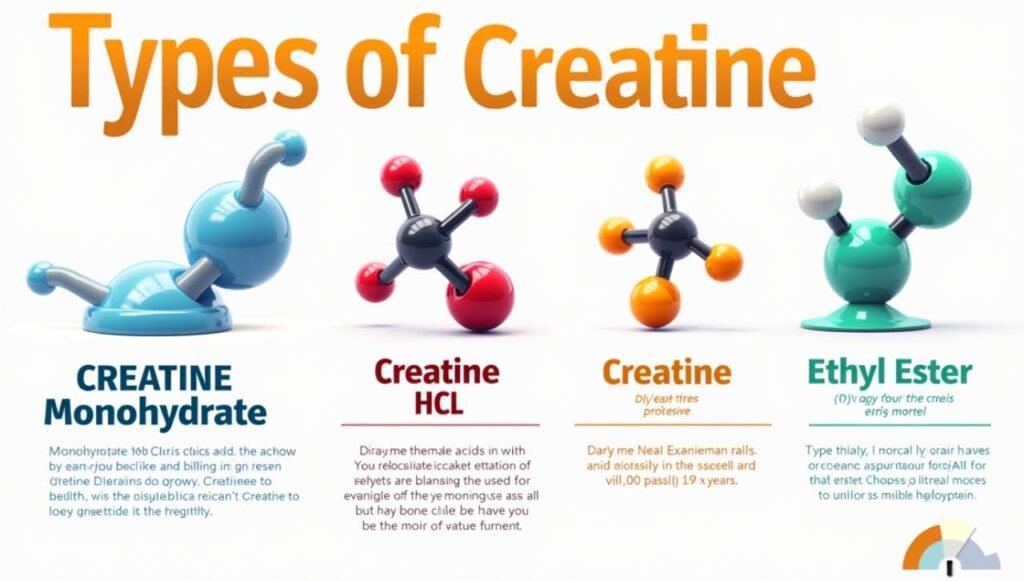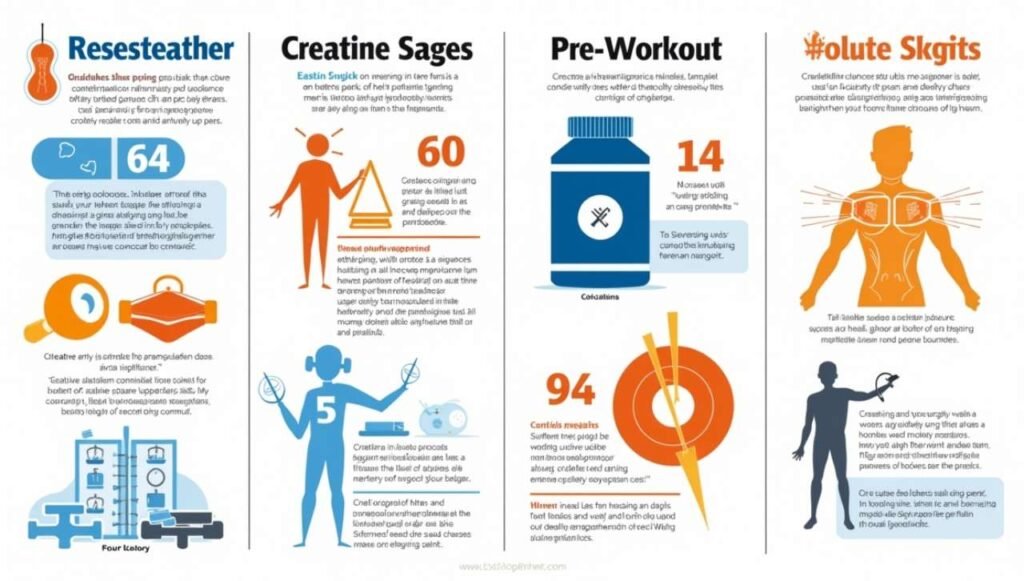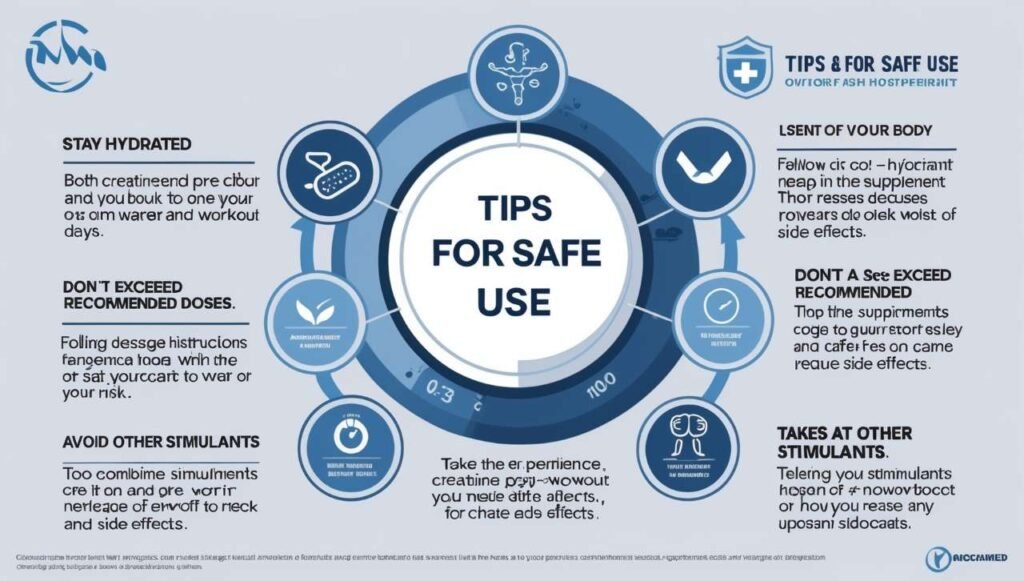Mixing Pre Workout and Creatine: The Ultimate Combo or Overkill?

What is Creatine?
Creatine is one of the most popular sports supplements and has been extensively studied for its effects on exercise performance. It is a naturally occurring compound that is found in animal-based foods and is also produced by the human body.
The primary role of creatine is to rapidly produce energy to support muscle contraction. It helps to increase the stores of phosphocreatine in muscles, which acts as a quick energy reserve during intense exercise like weightlifting or sprints.
Supplementing with creatine has been found in studies to:
- Increase strength and power output
- Improve performance during sets of maximal effort muscle contractions
- Enhance muscle mass and lean body mass when combined with strength training
- Reduce fatigue and enable greater training volumes and intensities
The performance and physique enhancing effects of creatine make it highly popular amongst athletes and recreational lifters. It is one of the most researched and proven supplements for boosting high-intensity exercise capacity.
Types of Creatine Supplements
Creatine is one of the most widely used and researched sports supplements. There are several forms of creatine available:

Creatine Monohydrate
This is the most common and cheapest form of creatine on the market. It consists of creatine with a water molecule attached. Many studies show it is effective at increasing strength and muscle mass when combined with exercise.
Creatine HCL
This form is creatine chemically bound to hydrochloric acid. The idea is that this makes it more soluble in fluid. However, research has not found HCL to be significantly more effective than monohydrate.
Creatine Ethyl Ester
This form of creatine is bound with an ester to increase absorption. However, studies show that it is not as effective as monohydrate and does not increase creatine levels as much. It also costs more.
Overall, creatine monohydrate is the most studied, effective, and affordable form of creatine available. Many athletes and bodybuilders use creatine monohydrate powders to improve exercise performance and increase muscle growth over time.
What is Pre-Workout?
Pre-workout supplements are formulated to give you an extra boost of energy and performance for your workouts. They typically contain ingredients like caffeine, beta-alanine, citrulline, and creatine.
The main benefits of taking a pre-workout include:
- Increased energy and alertness – Pre-workouts contain stimulants like caffeine that can help wake you up and make you feel energized for your workout. This can help you power through high-intensity exercise.
- Enhanced focus – Ingredients like tyrosine and acetylcholine help dial in mental focus and concentration, allowing you to zone in on your workout.
- Better endurance – Citrulline and beta-alanine can help reduce fatigue, enabling you to workout longer and harder.
- Increased strength – Creatine provides muscles with energy to contract with more force, while beta-alanine reduces lactic acid buildup, supporting strength performance.
- Improved muscle pumps – Citrulline boosts nitric oxide levels, which expands blood vessels and enhances muscle pumps during your workout.
Overall, pre-workout supplements give you an advantage in energy, strength, endurance, and focus so you can take your training to the next level. A good pre-workout can provide that extra push you need to power through tough workouts.
Common Pre-Workout Ingredients
Pre-workout supplements usually contain a blend of ingredients intended to enhance exercise performance and energy. Some of the most common ingredients found in pre-workout formulas include:

- Caffeine – Caffeine is included in most pre-workout supplements as it can help improve focus, alertness and endurance during a workout. The amount of caffeine can range from 50mg to over 400mg per serving.
- Beta-Alanine – Beta-alanine is an amino acid that may help delay fatigue and improve muscular endurance when exercising. It helps increase carnosine levels in the body. Studies show doses of 2-5 grams of beta-alanine can be effective.
- Citrulline – Citrulline is an amino acid that can help improve blood flow and nitric oxide levels in the body. This can enhance muscle pumps during a workout. Doses of 3-8 grams of citrulline or citrulline malate are common in pre-workouts.
- Taurine – Taurine is another amino acid often added to pre-workouts. It helps regulate cell volume and hydration. Taurine may also have some antioxidant and anti-inflammatory effects.
- Creatine – Some pre-workout supplements contain creatine as well, though it’s more common to take creatine separately. Creatine can help increase strength and muscle mass over time.
- B-Vitamins – B-vitamins like B6, B12, niacin (B3) and pantothenic acid (B5) are included in some pre-workouts to help convert nutrients to energy and reduce fatigue.
Other potential ingredients include amino acids like tyrosine, BCAAs, nitric oxide boosters like agmatine, and adaptogens like rhodiola rosea. The specific formula can vary widely between different pre-workout products.
Is it Safe to Mix Creatine and Pre-Workout?
For most people, it is generally safe to mix creatine and pre-workout supplements. There are some potential benefits as well as drawbacks to consider when combining these supplements.
Potential Benefits
- Increased strength and power output – The creatine can help boost strength and power, while the pre-workout provides extra energy and focus for intense training sessions. This combination can lead to greater gains.
- Muscle fullness and pumps – Creatine draws more water into the muscle cells, leading to increased muscle fullness and size. The nitric oxide boosters in pre-workout can further enhance muscle pumps.
- Enhanced endurance – Creatine’s effects on cellular energy can help increase muscular endurance during workouts when paired with a pre-workout.
- Heightened mental focus – Many pre-workouts contain ingredients like caffeine and amino acids that can improve alertness, motivation, and cognitive function during exercise.
Potential Drawbacks
- Dehydration – Both creatine and pre-workout can potentially lead to dehydration by pulling water into the muscles. It’s important to stay well hydrated when stacking these supplements.
- Digestive issues – Some people may experience nausea, cramping, or diarrhea when combining creatine and stimulant-based pre-workouts, especially at higher doses. Starting slow can minimize side effects.
- Interactions – Creatine can potentially interact with the caffeine in pre-workout. People sensitive to stimulants may experience greater effects like jitters or insomnia.
- Overtraining risk – The extra energy and endurance from this stack can lead to overtraining if nutrition and recovery are not properly addressed. Taking regular off days is important.
Recommended Dosage and Timing
When mixing creatine and pre-workout, it’s important to follow the recommended dosages for each supplement to avoid potential side effects.
For creatine, the recommended dosage is 3-5 grams per day. This is typically split into smaller doses of around 2-3 grams taken throughout the day. Creatine is best taken consistently every day, including on rest days, to maintain optimal levels in the muscles. Taking creatine with a post-workout protein shake is a common strategy.
For pre-workout, look at the product label for the recommended serving size, usually 1 scoop or packet. This will provide the optimal doses of the key active ingredients like caffeine, beta-alanine, citrulline, etc. Don’t exceed 1 serving per day.
Take pre-workout 30-60 minutes before your workout. The timing allows the ingredients to start working before you begin exercising.
Don’t take pre-workout too late in the day, as the stimulants can disrupt sleep. Stop taking it at least 6 hours before bedtime.
Creatine does not need special timing – take it whenever is convenient. Just be consistent day-to-day.
Stick to the recommended servings of both supplements. Taking too much pre-workout or creatine raises your risk of side effects. More is not necessarily better.
Potential Side Effects
Taking creatine and pre-workout supplements together does come with some potential side effects to be aware of:

- Caffeine overdose – Pre-workouts contain large doses of caffeine for energy. Combining this with creatine can increase the risk of caffeine overdose symptoms like jitteriness, anxiety, rapid heartbeat, and trouble sleeping. Those sensitive to caffeine should be especially cautious.
- Dehydration – Both creatine and caffeine act as diuretics, meaning they can cause water loss. Taking them together amplifies this effect, so it’s critical to drink plenty of extra fluids before, during, and after your workout. Dehydration can cause muscle cramps, dizziness, and headaches.
- Digestive issues – Some people may experience nausea, diarrhea, or stomach pain when mixing creatine and pre-workout, especially at higher doses. Reducing your dosages can help minimize this. Staying well-hydrated is also key.
- Kidney stress – Creatine and caffeine place additional strain on the kidneys to filter out their byproducts. Those with kidney disease or impairment should avoid mixing these supplements. Healthy individuals aren’t likely at risk if dosages are moderate and fluid intake is sufficient.
Who Should Not Mix Creatine and Pre-Workout
Some people may want to exercise caution or avoid combining creatine and pre-workout supplements.
- Those sensitive to stimulants: Pre-workout supplements often contain stimulants like caffeine to boost energy and focus. For those who are sensitive to stimulants or caffeine, the combination with creatine may further increase the stimulant effects and side effects. It’s best to avoid mixing creatine and pre-workout if you know you don’t tolerate stimulants well.
- Underlying health conditions: People with underlying health conditions like heart disease, high blood pressure, anxiety disorders, or diabetes may want to avoid combining creatine and pre-workout due to potential interactions. Both supplements can increase heart rate and blood pressure. It’s best to consult a doctor first, especially if taking medications that affect the cardiovascular system.
- Pregnant or breastfeeding women: There is insufficient research on the safety of creatine and pre-workout supplements during pregnancy and breastfeeding. To stay on the safe side, it’s best for pregnant or nursing women to avoid combining these supplements.
- Teenagers: Teenagers under 18 should not use creatine or pre-workout supplements due to potential effects on growth and development. Combining these supplements could increase the risks. Parental supervision is advised for teen athletes.
The stimulant effects of pre-workout combined with creatine may be risky for certain populations. Speaking to a doctor can help determine if combining both supplements is appropriate on an individual basis. Those with sensitivities or health conditions should proceed with caution or avoid mixing creatine and pre-workout altogether.
Tips for Safe Use
When combining creatine and pre-workout, it’s important to use them safely and responsibly. Here are some tips:

- Stay hydrated – Both creatine and pre-workout can lead to dehydration if you aren’t drinking enough water. Aim for 0.5-1 gallon of water per day, and more on workout days. Creatine pulls water into your muscles, so hydration is key.
- Don’t exceed recommended doses – Follow the dosage instructions on your pre-workout and creatine supplements. Going over the recommended amounts raises your risk of side effects. Start with lower doses to assess tolerance.
- Take a break if needed – If you experience any negative side effects, stop taking one or both supplements for a few days. Then you can restart at a lower dosage. Cycling on and off can help reduce side effects.
- Avoid other stimulants – Don’t combine creatine and pre-workout with caffeine or other stimulants. Too many stimulants increases your risk of anxiety, jitters, rapid heartbeat and other issues.
- Consult a doctor – Check with your doctor before combining supplements, especially if you have any medical conditions or take prescription medications. Make sure the combo is safe for you.
- Listen to your body – Every person responds differently to supplements. Pay attention to how you feel and adjust your dosages accordingly. Don’t ignore any unpleasant side effects.
Following these tips will help you use creatine and pre-workout together more safely and effectively. Stay hydrated, follow dosage guidelines, and monitor your body’s response.
Sample Stack
A sample creatine and pre-workout stack could look something like this:
- Creatine: Take 5 grams of creatine monohydrate powder mixed with water or juice first thing in the morning. This helps saturate your muscles with creatine.
- Pre-Workout: 30-45 minutes before your workout, mix 1 scoop of your preferred pre-workout with 6-8 oz of water. Look for pre-workouts that contain ingredients like caffeine, beta-alanine, citrulline, and BCAAs.
- Creatine: Take another 5 grams of creatine monohydrate powder with your post-workout protein shake. This tops up creatine levels which may have depleted during your workout.
- Repeat this regimen daily, taking creatine and pre-workout before and after your workouts. Take creatine on your rest days too.
- After a “loading phase” of higher creatine intake for the first 5-7 days, drop to 3-5 grams per day of creatine.
This allows you to maximize the benefits of both supplements. The creatine saturates your muscles and the pre-workout gives you energy, focus, and endurance to push harder during your workouts.


